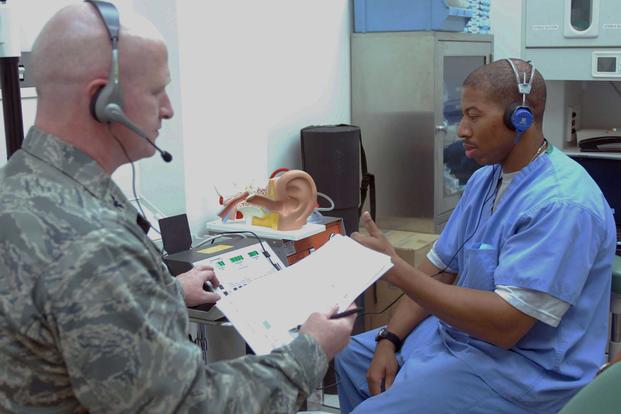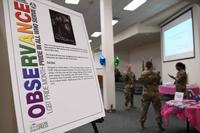Tinnitus is the number one disability among Veterans and it affects at least one in every 10 American adults.
Veterans have higher rates of tinnitus than the general public due to the noise levels they encounter while in the service, including gunfire, machinery, aircraft, and much more. Over 167,000 veterans were diagnosed with tinnitus in 2021 and over 2.5 million veterans are currently receiving disability benefits for it.
What is Tinnitus?
Tinnitus is defined as the perception of ringing, hissing, or other sound in the ears or head when no external sound is present. For some people, tinnitus is just a nuisance. For others, it is a life altering condition.
Tinnitus is classified in one of two categories:
- subjective tinnitus is a condition whereby only the sufferer can hear the noise produced within their head
- objective tinnitus is a condition whereby others are able to hear sounds like clicks or crackling inside the middle ear
Some describe ringing sounds, a buzzing sound, a high-pitched whistle, or numerous other sounds. The causes and effects of tinnitus vary from individual to individual.
Can Tinnitus Be Cured?
In most cases, there is no specific cure for tinnitus. If your doctor finds a specific cause of your tinnitus, they may be able to eliminate it. Determining the cause may require extensive testing including X-rays, balance tests, and laboratory work. Many causes cannot be identified. Occasionally, medicine may help the noise and medication options are varied. Alternatively, behavioral medicine treatments may be tried based on research that suggests that tinnitus can be induced or made worse by stress, anxiety, fatigue, frustration, etc.
Tinnitus Treatment Options
Since there is no cure for tinnitus, VA doctors recommend an interdisciplinary approach. The goal is for patients to learn to self-manage their reactions to the tinnitus.
Concentration and relaxation exercises can help to control muscle groups and circulation throughout the body. The increased relaxation and circulation achieved by these exercises can reduce the intensity of tinnitus in some patients, particularly under the guidance of a behavioral health clinician.
White Noise may help mask tinnitus and make it less noticeable. Since tinnitus is usually more bothersome in quiet surroundings, a competing sound at a constant low level, such as a ticking clock or radio static (also known as "white noise") may mask the sound. Products that generate white noise are available online. Some veterans have also used things like small fountains or water walls, and they say the sound of falling or bubbling water helps them forget the ringing of tinnitus.
Hearing aids may also help. If you experience hearing loss, a hearing aid may reduce or temporarily eliminate head noise. It is important to set the hearing aid at moderate levels, because excessively loud levels can worsen tinnitus in some cases. You should always discuss the use of a hearing aid with your VA doctor. The VA may be able to provide you with one for free. Tinnitus maskers can be combined within hearing aids. They emit a competitive but pleasant sound that can distract you from the head noise. Some people find that a tinnitus masker may even suppress head noise for several hours after it is used.
The majority of people with tinnitus, about 80 percent, are not bothered by it; it doesn't affect their sleep or their ability to concentrate. The small percentage of people who struggle with the noise in their head can be more prone to other debilitating mental health problems, like depression and anxiety. It is not yet understood why tinnitus affects people so differently.
What to Do If You Notice Tinnitus Symptoms
If you are a veteran, and think you may have the symptoms of tinnitus, the first and foremost thing to do is to apply for disability benefits from the VA. You can do this online at the VA's eBenefits website. Once you apply for disability benefits, the VA will schedule an exam for you with an auditory specialist. The doctor will determine if you have tinnitus or any related conditions and make any treatment recommendations, they will also recommend payment of disability benefits if you are entitled. Even more importantly, the VA will have your hearing data on file so any future changes can be tracked and treated if necessary.
Stay on Top of Your Military Benefits
Not sure what your veteran health care benefits are? Keep up with all the changes and details. Subscribe to Military.com. and get all the latest updates straight to your inbox.











